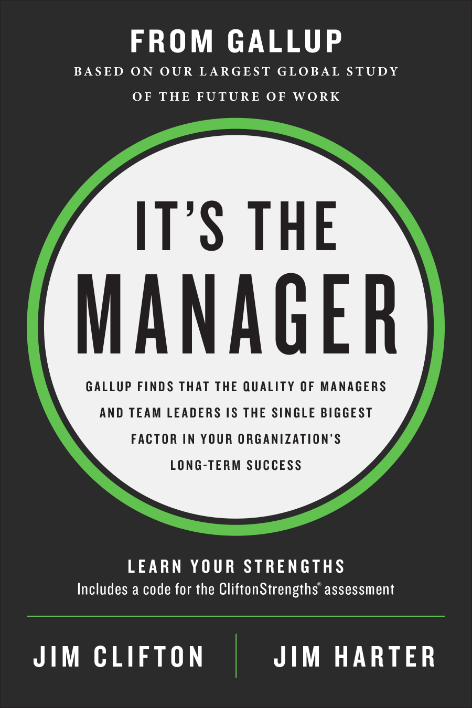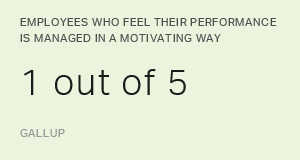Story Highlights
- Few managers give feedback that is helpful to employees
- Managers need to shift from past-focused feedback to future-oriented coaching
- Great coaching conversations are a two-way street
The six most dreaded words for any employee: Can I give you some feedback?
Gallup has found that only 26% of employees strongly agree that the feedback they receive helps them do better work.
Clearly, feedback isn't working the way it should.
When most organizations had hierarchical, top-down, command-and-control structures as their primary decision-making method, feedback was paramount. Information mostly needed to cascade downward in an organization, and the primary role of managers was to hold people accountable.
Today, as leaders know, the workplace is radically different. Modern organizations are more decentralized, matrixed and agile. Employees have greater autonomy and are required to be creative in how work gets done.
This means managers can't just give employees feedback about what they did "right" or "wrong." They must listen, ask questions, gain context and create a two-way dialogue.
The practice of management is far too complex for a simple rubric to transform how employees perform and develop. And there has never been a one-page checklist that can turn a bad manager into a good one.
Effective management requires managers to help employees prioritize multiple projects, shift deadlines, remove barriers and manage interpersonal challenges. There's hardly ever a single "perfect answer" to modern business problems.
In many professional situations, a successful outcome is based on emotional factors:
- how a customer feels after interacting with you
- how a team feels about a new initiative
- how a vendor feels about partnering with you
"Feedback" rarely makes sense in these situations. What you really want is an open, honest, two-way dialogue that strengthens relationships rather than one-way instruction and criticism.
To put it simply, traditional feedback is one direction (manager to employee), episodic (i.e., infrequent and isolated) and focused on past mistakes that can't be fixed.
Coaching conversations, on the other hand, are about now and what's next. Coaching conversations put the employee's strengths and future potential at the center, in an ongoing, middle-of-the-action dialogue.
Effective management requires managers to help employees prioritize multiple projects, shift deadlines, remove barriers and manage interpersonal challenges. There's hardly ever a single perfect answer to modern business problems.
Great Managers Lead Great Conversations
Imagine the best manager you've ever had. More than likely, they were great at having meaningful conversations -- where you felt like you were heard and understood.
They may have delivered difficult messages or pushed you harder than you were used to, but somehow it didn't feel bad. They didn't always follow a script or a rubric. They adapted their approach to what you needed in the moment.
That's the power of individualized conversations. An employee feels known, understood, heard and appreciated -- even when the topic of discussion isn't pleasant. Great managers build performance conversations around an employee's unique strengths, so that the dialogue is naturally positive and constructive.
Leaders need to understand that these skills don't come naturally to most managers. They need to be taught, ideally in a role-play or real-life environment, and developed over time.
Feedback Focuses on the Past; Coaching Conversations Focus on the Future
Business today moves fast. Employees need to be adaptable in an environment where every aspect of a business can be ripe for disruption.
Like a good coach, great managers are always thinking about the next play, the next game and the next win.
They keep conversations focused on the future. What can we do to improve our chances of success next time? What would it look like to exceed our expectations? How can we prepare for the future?
Great managers are achievement-oriented and focused on developing their teams.
That's not to say managers should stop giving feedback all together. There's no doubt that reflecting on past performance and discussing how it went is important -- it facilitates learning.
The problem is employees typically experience feedback as criticism that is delivered far too long after the fact. Feedback is helpful when it's immediate and constructive. And even then, feedback alone does not translate to great coaching.
Improving feedback -- how you tell people about your observations and opinions -- is a low bar. It captures a small sliver of the picture.
Often, managers don't adequately observe performance or have enough expertise to tell employees how work should actually be done. Great managers take their coaching to the next level by observing, listening and proactively anticipating topics that will be useful to employees in the future.
They paint a vision for the future -- a portrait of success -- and establish ongoing dialogue with employees that helps them comfortably discuss issues they encounter along the way.
Like a good coach, great managers are always thinking about the next play, the next game and the next win. They keep conversations focused on the future.
Great Coaching Conversations Are a Busy, Two-Way Street
Employees often feel like feedback "happens" to them. While well-intended, it's an event that tends to feel critical and condemning. And worse, research shows that it only improves performance about one-third of the time, while actually making it worse one-third of the time.
Great coaching conversations are a two-way street. Employees should feel encouraged to share their perspective, ask questions and bring issues to their manager. And it should be a busy two-way street. Frequent, meaningful conversations are key to fostering collaboration and engaged performance.
Great coaches inspire you to achieve more than you thought you could. They do exponentially more than just tell you what to do. They teach you to own your performance, do what's best for the organization and be a great partner.
By opening the door to great conversations, difficult conversations become easier, too. Important issues are no longer a surprise -- you can see them coming and hopefully do something about them before they become a problem.
Imagine trying to have a really tough conversation before that busy, two-way street has been established. Addressing sensitive topics like diversity and inclusion, pay, promotion, or under-performance are all going to feel scary if you haven't already built up some understanding and trust with your teammate.
Addressing sensitive topics like diversity and inclusion, pay, promotion, or under-performance are all going to feel scary if you haven't already built up some understanding and trust with your teammate.
Learn From the Best Manager You've Ever Had (or Wish You Had)
Great managers inspire independence and ownership in pursuit of high performance. That only comes through frequent, open-ended conversations where people feel like their honest opinions will be valued and respected.
Managers today may not be the experts in every situation, but they can shape conversations and deliver support in a way that leads to continual improvement.
Leaders can take the initiative here. They can change the expectations for how collaboration happens and how work gets done in their organizations. They can set up learning and development programs that teach these coaching skills to their top managers.
And leaders can model these behaviors themselves:
- Learn more about your employees.
- Ask questions.
- Listen.
- Encourage them to bring their best ideas.
- Help them play to their strengths.
Do this consistently and you'll become the great partner they want to talk to.
Learn more about creating conversations that improve people's performance:
- Download our Re-Engineering Performance Management paper.
- Sign up for Gallup's Leading High Performance Teams course.
- Empower your managers to have the right conversations using the tools and solutions inside the Gallup Access platform.





